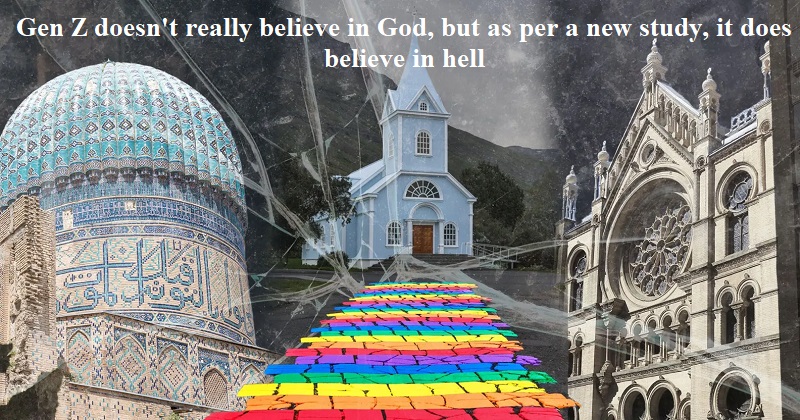
Gen Z, known for being cool and less religious, surprisingly believes in hell, according to a new study. The study reveals that Generation Z is nearly twice as likely to believe in hell compared to baby boomers. While only 18 percent of baby boomers believe in the concept of damnation, a significant 32 percent of Gen Z holds this belief.
Interestingly, it’s not just Gen Z, but millennials also believe in hell. This contradicts the assumption that younger generations, who often identify as atheists, would reject the idea of damnation. The belief in hell seems to belong to an age when fear of punishment after death shaped people’s lives.
The study’s findings are derived from the ‘World Values Survey,’ one of the largest and most respected social surveys conducted by the Policy Institute at King’s College, London. The survey also reveals that younger generations in the United Kingdom are more likely to believe in life after death compared to older generations.
The difference between Gen Z and baby boomers is quite stark. The World Values Survey found that both Gen Z and millennials have a 32 percent belief in hell, while only 24 percent of the pre-war generation and a mere 18 percent of baby boomers share this belief.
In terms of religiosity, only 27 percent of millennials and Gen Z identify as religious, whereas 46 percent of the pre-war generation considered themselves religious. In 1981, 69 percent of the older generation claimed religious inclination.
The statistics for the United Kingdom are based on a representative sample of 3,056 adults interviewed by Ipsos through a combination of face-to-face and online surveys. The study categorizes generations based on birth years, with the pre-war generation born before 1945, baby boomers between 1945 and 1965, Gen X from 1966 to 1979, millennials from 1980 to 1995, and Gen Z born from 1996 onwards.
Interestingly, the study reveals that belief in heaven has also declined among the British public. Between 1981 and 2022, the percentage of people believing in heaven decreased from 57 percent to 41 percent. Furthermore, the belief in God has also decreased, with just under half of Britons expressing belief in 2022, compared to three-quarters in 1981. Among the 24 nations included in the study, only five showed a lower likelihood of believing in God compared to the UK, with China having the lowest percentage at 17 percent.
Bobby Duffy, director of the Policy Institute, commented on the findings, stating that while organized religion’s influence has declined in the UK, the belief in something beyond this life remains strong, especially among the youngest generations. The cultural attachment to formal religion may have decreased, but the need to believe in “something” beyond this life remains prevalent.
Over the past four decades, beliefs regarding life after death have remained consistent, with slightly less than half of the public consistently expressing belief in it. However, younger individuals demonstrate higher levels of belief, with slightly over half of Gen Z and millennials believing in life after death, in contrast to 35 percent of baby boomers and 39 percent of the pre-war generation.

Post Your Comments